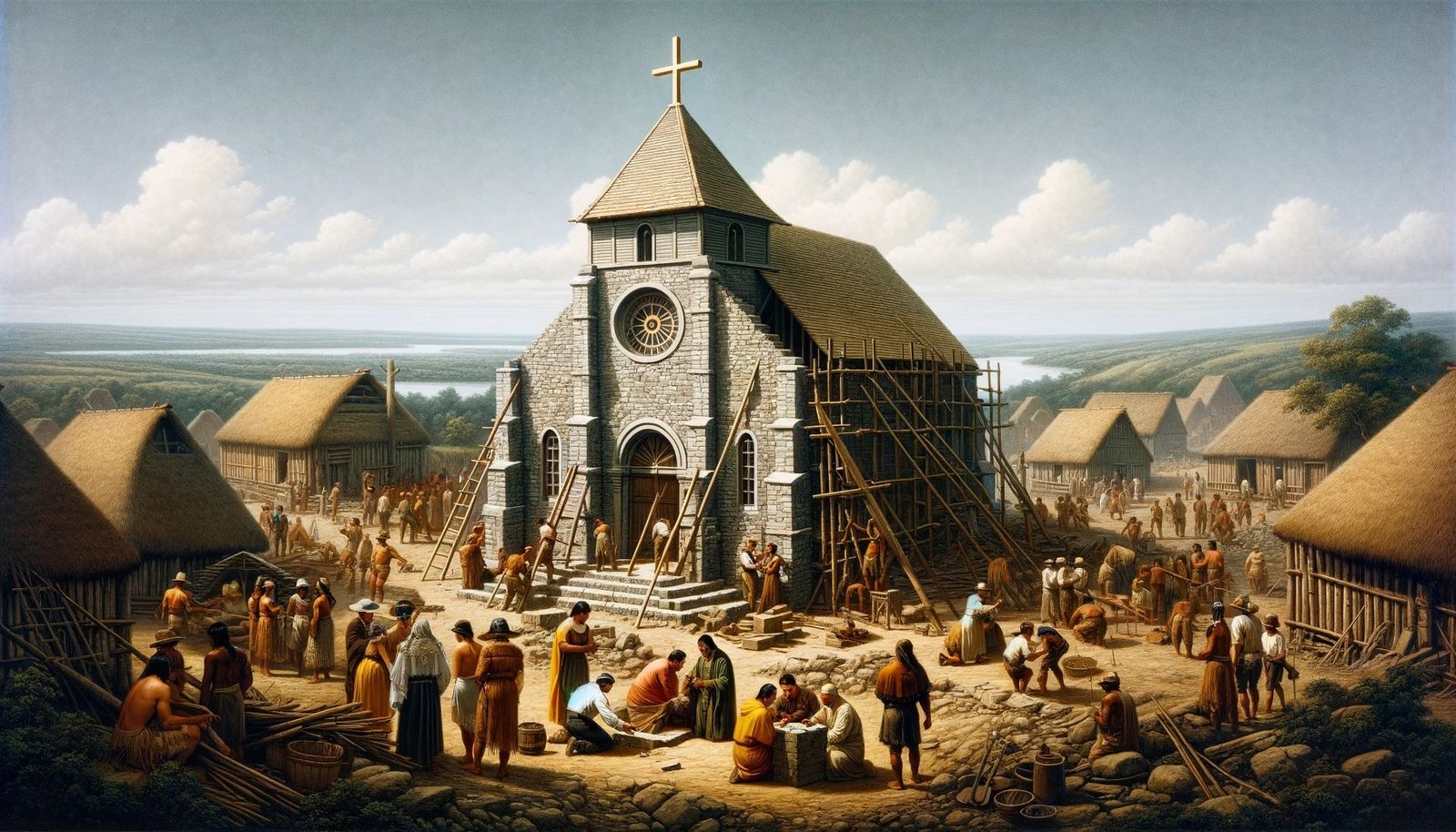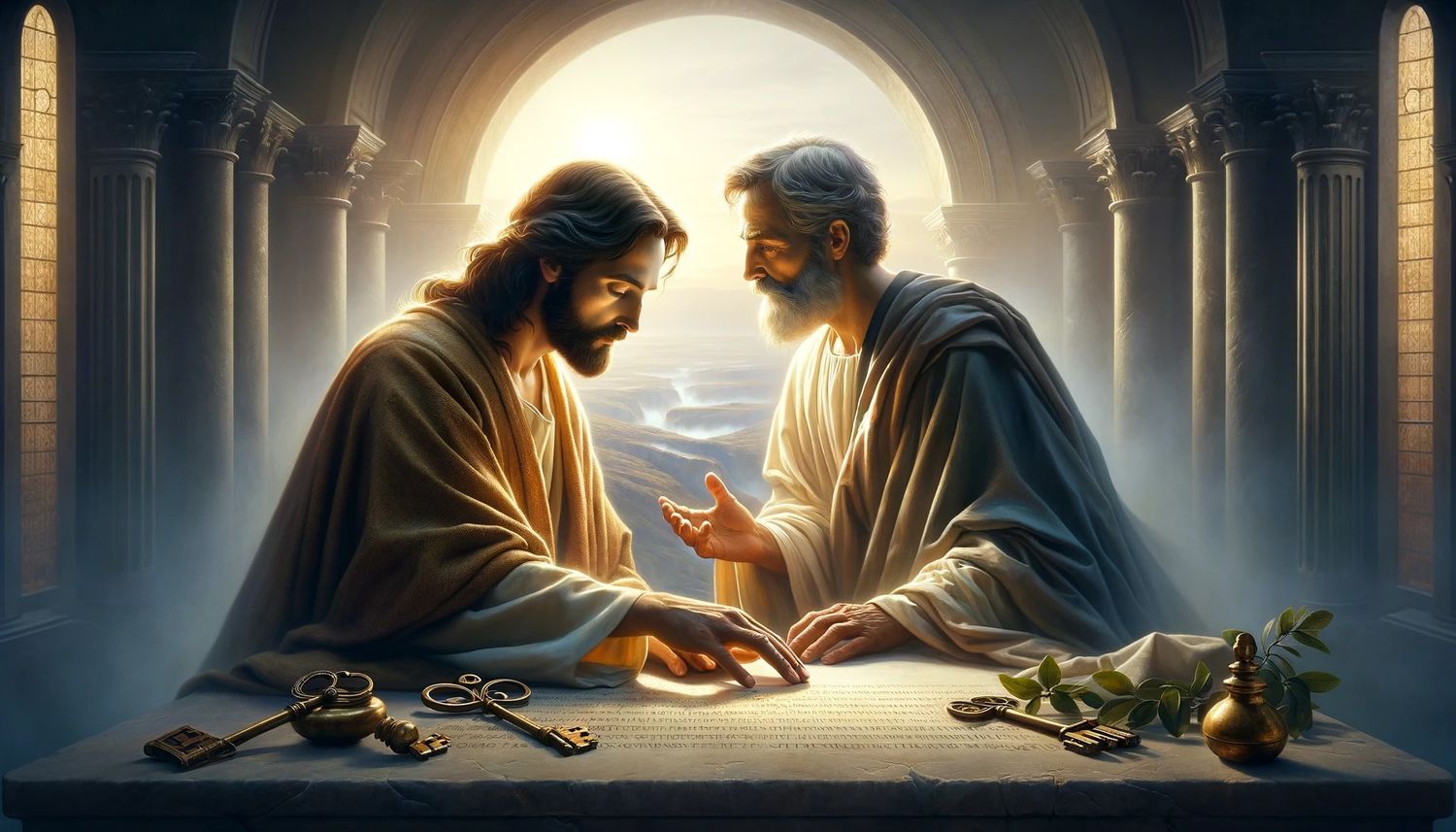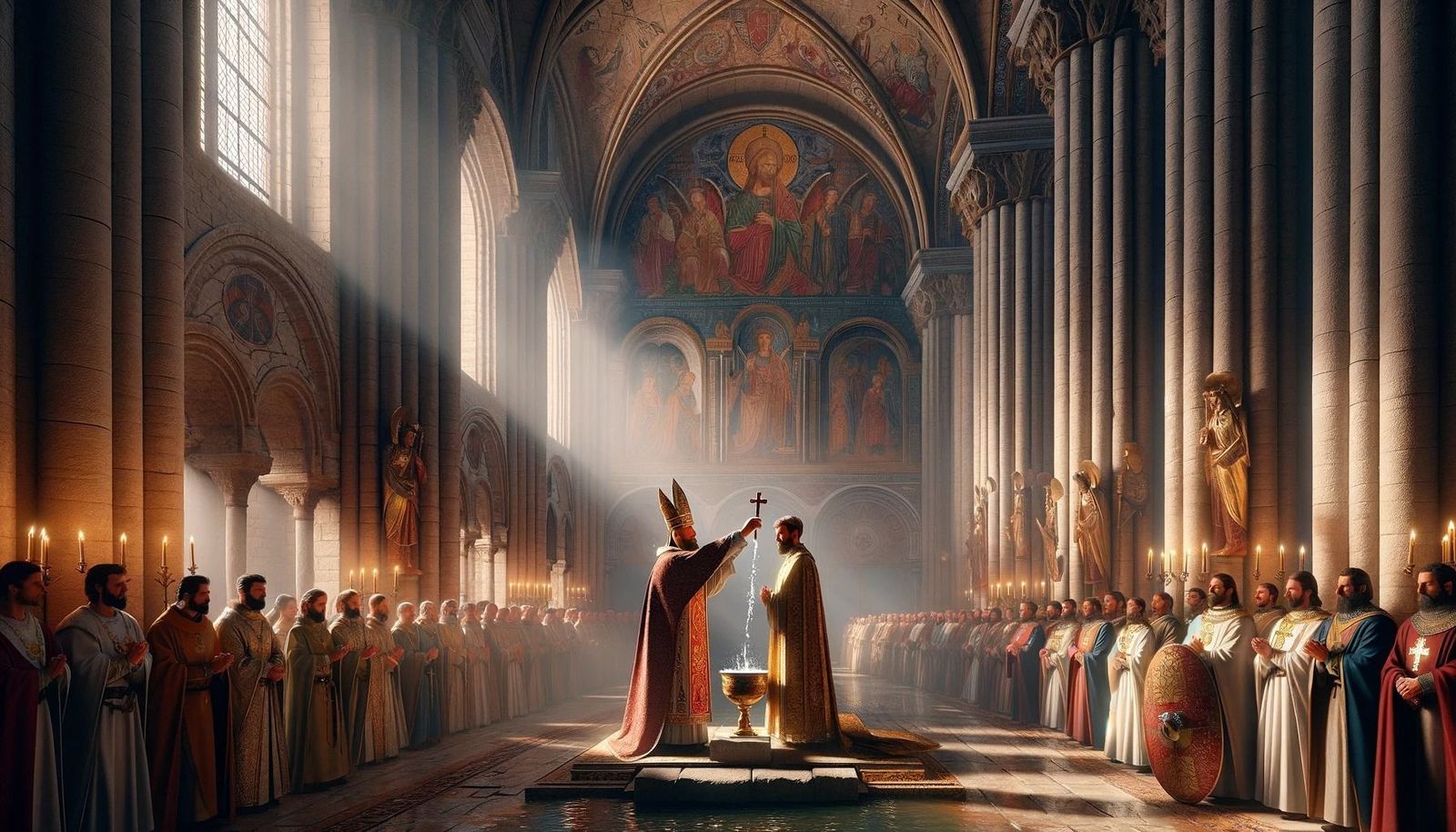Home>Theology and Spirituality>In What Ways Did Martin Luther Challenge Roman Catholicism?


Theology and Spirituality
In What Ways Did Martin Luther Challenge Roman Catholicism?
Published: February 18, 2024
Peter Smith, Editorial Director at Christian.net, combines deep insights into faith, politics, and culture to lead content creation that resonates widely. Awarded for his contributions to religious discourse, he previously headed a major organization for religious communicators, enhancing dialogue on faith's societal impacts.
Discover how Martin Luther's challenges to Roman Catholicism reshaped theology and spirituality. Explore the impact of his bold actions and ideas.
(Many of the links in this article redirect to a specific reviewed product. Your purchase of these products through affiliate links helps to generate commission for Christian.net, at no extra cost. Learn more)
Table of Contents
Introduction
The Reformation, a pivotal period in Christian history, was ignited by the bold actions of Martin Luther, a German monk and theologian. Luther's unwavering commitment to challenging the established doctrines and practices of the Roman Catholic Church reverberated across Europe, sparking a profound transformation in the religious landscape. His courageous stance against the perceived corruption and deviation from biblical teachings within the Church set in motion a series of events that would forever alter the course of Christianity.
Martin Luther's journey from a devout monk to a revolutionary figure was marked by a deep sense of conviction and a fervent dedication to reforming the Church. His unwavering belief in the primacy of faith and the authority of Scripture propelled him to confront the prevailing practices of indulgences, the sacramental system, and the hierarchical structure of the Church. Through his writings, sermons, and courageous actions, Luther challenged the status quo and laid the groundwork for a profound theological and ecclesiastical revolution.
As we delve into the life and legacy of Martin Luther, it becomes evident that his impact transcended the confines of his era, shaping the beliefs and practices of millions of Christians worldwide. The seismic shift initiated by Luther's bold stand continues to resonate in contemporary discussions on theology, spirituality, and the nature of the Church. By examining the key events and doctrines that defined Luther's legacy, we gain a deeper understanding of the profound impact of his actions and the enduring relevance of his theological insights.
Read more: What Does Martin Luther Say About Communion
Martin Luther's Early Life and Education
Martin Luther, born on November 10, 1483, in Eisleben, Germany, was raised in a humble yet deeply religious household. His father, Hans Luther, a successful copper miner, envisioned a prosperous future for his son and thus sent him to schools in Mansfeld, Magdeburg, and Eisenach to receive a quality education. However, Luther's path took a significant turn when he decided to pursue a legal career, enrolling at the University of Erfurt.
It was during his time at the university that Luther experienced a profound spiritual awakening. In 1505, while traveling back to the university after a visit to his family, he found himself caught in a violent thunderstorm. In a moment of intense fear, Luther made a vow to St. Anne, the patron saint of miners, promising to become a monk if he survived. Miraculously, he emerged unscathed, and true to his word, he abandoned his legal studies and entered the Augustinian monastery in Erfurt.
Luther's decision to become a monk was met with resistance from his father, who had high hopes for his son's legal career. However, Luther was resolute in his newfound calling, driven by a deep sense of spiritual fervor and a desire for salvation. His time in the monastery was marked by rigorous ascetic practices and a relentless pursuit of spiritual fulfillment.
In 1507, Luther was ordained as a priest, and his intellectual prowess and dedication to theological studies led him to pursue a doctorate in theology. He immersed himself in the teachings of the Bible and the writings of prominent theologians, including Augustine and Paul the Apostle. His academic pursuits equipped him with a profound understanding of the Scriptures and a keen awareness of the theological intricacies that would later shape his reformist endeavors.
Luther's formative years in the monastery and his rigorous theological education laid the foundation for his future role as a transformative figure in Christian history. His early experiences instilled in him a deep reverence for the Scriptures and a fervent commitment to understanding the nature of faith and salvation. These foundational elements would profoundly influence his theological convictions and propel him towards challenging the established norms of the Roman Catholic Church.
The Ninety-Five Theses
On October 31, 1517, Martin Luther, driven by a fervent desire to address the issue of indulgences, took a momentous step that would reverberate throughout Europe. In a bold and unprecedented move, Luther penned his Ninety-Five Theses and, in accordance with academic custom, affixed them to the door of the Castle Church in Wittenberg. This act, intended to initiate scholarly debate, inadvertently sparked a seismic shift in the religious landscape, setting in motion the Protestant Reformation.
The Ninety-Five Theses, written in Latin, comprised a series of propositions that challenged the prevailing practices of indulgences within the Roman Catholic Church. Luther's primary contention centered on the erroneous belief that the purchase of indulgences could secure the remission of sins and ensure salvation. He vehemently argued that true repentance and genuine contrition were indispensable for the forgiveness of sins, emphasizing the primacy of inner spiritual renewal over external rituals or monetary transactions.
Luther's critique of indulgences struck at the core of the Church's revenue-generating mechanisms, as indulgences had become a lucrative source of income for the papacy. The dissemination of the Ninety-Five Theses, facilitated by the recent invention of the printing press, rapidly captured the public's attention, sparking widespread debate and scrutiny of the Church's practices.
The impact of the Ninety-Five Theses extended far beyond the confines of Wittenberg, inciting fervent discussions and eliciting both support and opposition from various quarters. Luther's bold assertions resonated with a populace disillusioned by the perceived excesses and distortions within the Church, igniting a groundswell of support for his reformist agenda.
The Ninety-Five Theses, while initially intended as a scholarly discourse, served as a catalyst for a profound reevaluation of established religious doctrines and practices. Luther's unwavering commitment to biblical truth and his willingness to challenge entrenched authority set in motion a transformative movement that would reshape the theological landscape of Christianity.
The resonance of the Ninety-Five Theses transcended the academic realm, permeating the consciousness of the masses and sowing the seeds of a profound religious upheaval. Luther's courageous act of posting the Ninety-Five Theses heralded the dawn of a new era, one characterized by a fervent quest for spiritual authenticity and a resolute rejection of doctrinal distortions.
The Doctrine of Justification by Faith
At the heart of Martin Luther's theological convictions lay the profound doctrine of justification by faith, a cornerstone of the Protestant Reformation. Luther's exploration of this pivotal doctrine stemmed from his deep immersion in the Scriptures and his relentless pursuit of understanding the nature of salvation. The doctrine of justification by faith encapsulates the belief that individuals are justified, or declared righteous, not by their own merits or good works, but solely through faith in the redemptive work of Jesus Christ.
Luther's theological insights on justification by faith emerged as a direct response to the prevailing teachings and practices of the Roman Catholic Church, particularly concerning the role of good works and sacraments in securing salvation. Central to Luther's doctrine was the conviction that salvation is a gracious gift bestowed by God, apprehended through faith alone. This radical departure from the established sacramental system and emphasis on human effort challenged the entrenched theological framework of the time.
In his seminal work, "The Freedom of a Christian," Luther expounded on the profound implications of justification by faith, articulating the dual nature of the Christian as simultaneously justified and liberated. He underscored the transformative power of faith, asserting that through faith in Christ, believers are not only justified before God but also liberated to love and serve others without the burden of striving for self-justification.
Luther's doctrine of justification by faith reverberated across Europe, igniting a fervent reevaluation of the relationship between faith, works, and salvation. His unwavering emphasis on the primacy of faith as the means of apprehending God's grace resonated deeply with individuals disillusioned by the perceived burden of meritorious works and sacramental obligations.
The doctrine of justification by faith, as articulated by Luther, continues to exert a profound influence on Christian theology and spirituality. Its enduring relevance lies in its affirmation of the unmerited nature of God's grace and the transformative power of faith in the lives of believers. Luther's bold proclamation of justification by faith stands as a testament to his unwavering commitment to restoring the primacy of biblical truth and the liberating message of the Gospel.
Luther's profound insights into the doctrine of justification by faith not only reshaped the theological landscape of his era but also continue to inspire and inform discussions on the nature of salvation, faith, and the transformative power of God's grace in the lives of believers.
The Priesthood of All Believers
Central to Martin Luther's theological framework was the revolutionary concept of the "priesthood of all believers," a doctrine that fundamentally challenged the hierarchical structure of the Roman Catholic Church and redefined the role of the laity within the Christian community. Luther's articulation of this doctrine marked a profound departure from the prevailing ecclesiastical paradigm, empowering every believer with a sense of spiritual agency and direct access to God.
At the core of the priesthood of all believers is the assertion that every individual, irrespective of their social status or vocation, possesses the capacity to serve as a priest before God. This radical reimagining of the priesthood dismantled the entrenched notion of a spiritual elite and emphasized the universal priesthood shared by all believers. Luther drew inspiration from biblical passages, particularly 1 Peter 2:9, which proclaims that believers are "a chosen race, a royal priesthood, a holy nation, a people for his own possession."
Luther's doctrine of the priesthood of all believers affirmed the inherent dignity and spiritual autonomy of every individual within the Christian community. It rejected the notion of a distinct class of clergy possessing exclusive access to God and the authority to mediate spiritual truths. Instead, Luther championed the idea that all believers, by virtue of their faith in Christ, were endowed with the privilege and responsibility of interceding for one another, proclaiming the Gospel, and engaging in acts of worship and service.
This egalitarian vision of the priesthood not only democratized spiritual authority but also engendered a profound sense of communal responsibility and mutual accountability within the Church. It fostered a paradigm shift wherein the laity were no longer passive recipients of spiritual instruction but active participants in the collective priesthood, contributing to the edification and enrichment of the entire body of believers.
Luther's advocacy for the priesthood of all believers resonated deeply with a populace disillusioned by the perceived spiritual elitism and clericalism prevalent within the Roman Catholic Church. His emphasis on the universal priesthood served as a catalyst for a reinvigorated sense of spiritual empowerment and communal engagement, laying the groundwork for a more participatory and inclusive expression of Christian faith.
The enduring legacy of the priesthood of all believers lies in its affirmation of the intrinsic worth and agency of every believer within the Christian community. Luther's radical redefinition of the priesthood continues to inspire contemporary discussions on the nature of spiritual vocation, communal responsibility, and the democratization of spiritual authority within the Church.
The Translation of the Bible into German
One of Martin Luther's most enduring and impactful contributions to the Reformation was his monumental endeavor to translate the Bible into German. This ambitious undertaking, which commenced in 1522 and culminated in the completion of the full Bible in 1534, represented a watershed moment in the history of Christianity and the German language. Luther's translation of the Bible not only facilitated widespread access to the Scriptures but also catalyzed a linguistic and cultural transformation that reverberated across the German-speaking world.
Luther's decision to translate the Bible into German was driven by a deep-seated conviction that the Word of God should be accessible to all individuals, transcending linguistic barriers and enabling believers to engage directly with the sacred texts. Prior to Luther's translation, the Scriptures were predominantly available in Latin, a language understood by a limited segment of the populace, primarily the clergy and the educated elite. By rendering the Bible into the vernacular German, Luther democratized access to the Word of God, empowering ordinary men and women to read, study, and interpret the Scriptures in their native tongue.
The impact of Luther's translation extended far beyond its linguistic significance, permeating the cultural and religious fabric of German society. The vernacularization of the Bible facilitated a profound democratization of religious knowledge, fostering a climate of individual engagement with the sacred texts and catalyzing a reformation of personal piety and religious practices. The translation of the Bible into German served as a catalyst for a burgeoning sense of national identity and cultural cohesion, as the German language, enriched by the cadences of biblical prose, assumed a central role in shaping the collective consciousness of the German people.
Luther's translation of the Bible into German not only facilitated a seismic shift in the accessibility and interpretation of the Scriptures but also engendered a linguistic and cultural legacy that endures to this day. The Luther Bible, renowned for its linguistic eloquence and literary impact, played a pivotal role in standardizing the German language, contributing to the development of a cohesive national identity and fostering a rich literary tradition. The enduring influence of Luther's translation underscores its profound significance as a catalyst for both religious and cultural transformation, leaving an indelible imprint on the spiritual and linguistic heritage of the German-speaking world.
The Formation of Lutheran Church
The formation of the Lutheran Church stands as a defining moment in the aftermath of Martin Luther's bold and transformative actions. The profound theological and ecclesiastical upheaval ignited by Luther's reformist endeavors culminated in the emergence of a distinct religious tradition that bore the indelible imprint of his theological insights and convictions.
The seeds of the Lutheran Church were sown amidst the tumultuous backdrop of the Protestant Reformation, a period characterized by fervent theological debates, ecclesiastical realignments, and the fervent quest for doctrinal purity. Luther's unwavering commitment to restoring the primacy of biblical truth and his radical departure from the sacramental and hierarchical structures of the Roman Catholic Church galvanized a growing cohort of adherents who resonated with his reformist vision.
The formation of the Lutheran Church was propelled by a confluence of factors, including the dissemination of Luther's writings, the proliferation of Protestant congregations, and the articulation of distinct theological tenets that delineated the Lutheran identity. Central to the formation of the Lutheran Church was the articulation of foundational doctrinal principles that distinguished it from the Roman Catholic tradition, including the doctrine of justification by faith, the priesthood of all believers, and the authority of Scripture.
The crystallization of the Lutheran Church as a distinct ecclesiastical entity was further facilitated by the formulation of confessional documents, most notably the Augsburg Confession, which served as a definitive statement of Lutheran beliefs and practices. This confessional document, presented to the Holy Roman Emperor Charles V in 1530, solidified the doctrinal distinctiveness of the Lutheran tradition and laid the groundwork for the organizational and institutional consolidation of Lutheran congregations.
The formation of the Lutheran Church engendered a sense of communal identity and theological coherence among its adherents, providing a unifying framework for worship, theological instruction, and ecclesiastical governance. The establishment of synods and church structures further bolstered the organizational infrastructure of the Lutheran Church, fostering a sense of communal accountability and shared theological heritage.
The enduring legacy of the formation of the Lutheran Church resides in its role as a catalyst for the proliferation of Protestant traditions and the enduring impact of Luther's theological insights. The emergence of the Lutheran Church not only signified a departure from the ecclesiastical status quo but also heralded a new chapter in the unfolding narrative of Christian diversity and theological plurality.
The formation of the Lutheran Church, rooted in the theological convictions and reformist zeal of Martin Luther, continues to shape the religious landscape, serving as a testament to the enduring legacy of the Protestant Reformation and the indelible imprint of Luther's transformative vision.
Conclusion
In conclusion, the indelible impact of Martin Luther's bold and transformative actions reverberates across the annals of Christian history, leaving an enduring legacy that transcends temporal and theological boundaries. Luther's unwavering commitment to challenging the established doctrines and practices of the Roman Catholic Church catalyzed a seismic shift in the religious landscape, heralding the dawn of the Protestant Reformation and reshaping the contours of Christian theology and ecclesiology.
From his formative years as a devout monk to his pivotal role as a transformative figure, Luther's journey epitomizes a resolute quest for theological authenticity and a fervent dedication to restoring the primacy of biblical truth. His Ninety-Five Theses, a clarion call for reform, ignited a fervent reevaluation of established religious doctrines and practices, propelling the Protestant Reformation into motion and inspiring a groundswell of support for his reformist agenda.
Luther's profound theological insights, including the doctrine of justification by faith and the priesthood of all believers, continue to resonate with believers and theologians, underscoring the enduring relevance of his reformist vision. His translation of the Bible into German not only democratized access to the Scriptures but also catalyzed a linguistic and cultural transformation that reverberated across the German-speaking world, leaving an indelible imprint on the spiritual and linguistic heritage of the region.
The formation of the Lutheran Church, a testament to the enduring impact of Luther's theological convictions, stands as a defining moment in the aftermath of the Protestant Reformation, delineating a distinct religious tradition that bears the indelible imprint of his reformist zeal. The emergence of the Lutheran Church not only signified a departure from the ecclesiastical status quo but also heralded a new chapter in the unfolding narrative of Christian diversity and theological plurality.
In essence, Martin Luther's legacy endures as a testament to the transformative power of unwavering conviction, the enduring relevance of biblical truth, and the indomitable spirit of reform. His bold and courageous actions continue to inspire and inform contemporary discussions on theology, spirituality, and the nature of the Church, serving as a poignant reminder of the enduring impact of one individual's resolute commitment to truth and reform.














